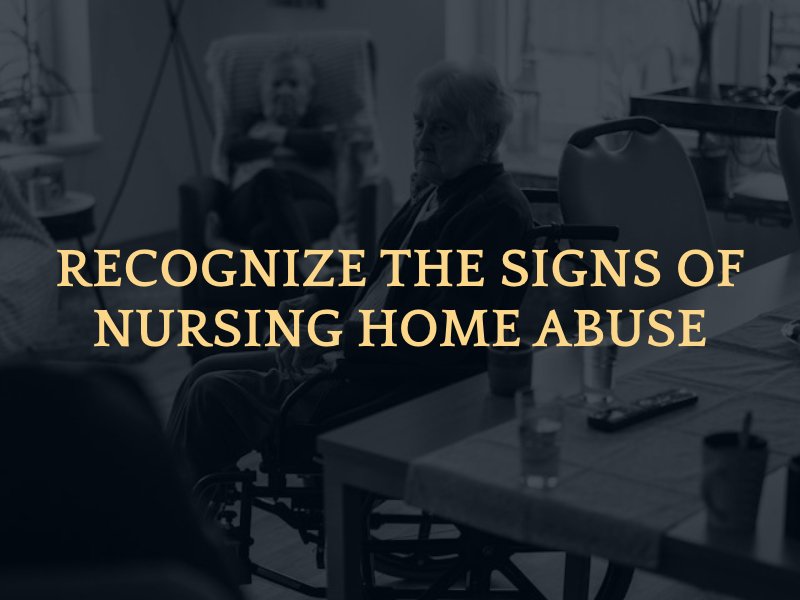
When our aging loved ones require care beyond our capabilities at home, family members seek the best possible nursing home within their financial capabilities. Nursing homes offer glossy brochures promising skilled, compassionate care with respect for the human dignity of the elderly. Sadly, many nursing homes do not live up to their promises. Nursing home abuse is a serious problem in the United States with as many as five million reported cases of elder abuse each year—and the numbers are believed to be widely underreported.
When a loved one experiences abuse in a nursing home, they may not be willing or cognitively able to report their abuse. It’s important for anyone with an aging family member in a nursing home to recognize signs of nursing home abuse.
Signs of Neglect in Nursing Homes
Neglect is the most common form of nursing home abuse, resulting in injuries, dehydration, malnutrition, infection, and death. Neglect in nursing homes occurs due to understaffing, inadequate staff training, poor supervision, and frequent staff turnover rates. Signs of neglect in a nursing home resident include the following:
- Dry lips and skin
- Dramatic weight loss
- Poor hygiene
- Unclean bed linens
- Untreated pressure sores (bedsores)
- Unclean room
- Signs of restraint use
- Uneaten meals left in the resident’s room
- Frequent falls
- Hair loss or thinning
- Missed medications
Neglect in nursing homes is a silent killer; dehydration and malnutrition cause rapid physical and cognitive decline. Poor hygiene and untreated bedsores lead to infection and deadly sepsis. When nursing home staff fails to properly monitor residents, the resident risk of falls, fractures, and head injuries increases.
Signs of Physical and Sexual Abuse in a Nursing Home
Physical abuse such as hitting, punching, kicking, pushing, and unnecessary restraint use is an egregious violation of the nursing home administrator’s duty to ensure that residents are treated with care, compassion, and respect. Abuse may happen from caregivers, nursing home maintenance staff, or other residents. Signs that a nursing home resident is experiencing physical abuse include the following:
- Unexplained injuries, including fractures, bruises, burns, and lacerations
- Broken personal items such as glasses, hearing aids, and dentures
- Ligature marks around the mouth, throat, wrists, and ankles
- Torn clothing or bedding
- Reluctance to speak in front of caregivers
- Bruising or bleeding on or around the breasts and privates
- Unexplained sexually transmitted diseases
About 1.9% of nursing home residents report sexual abuse, but experts believe that sexual abuse in nursing homes is underreported due to shame and stigma.
Signs of Emotional Abuse in Nursing Homes
Emotional abuse in nursing homes is a significant problem and can lead to depression, anxiety, and decreased quality of life in elderly residents. Victims of this type of abuse often do not report the problem due to feelings of shame or fear of repercussions from caregivers. Emotional abuse includes yelling, berating, belittling, name-calling, mocking, and bullying. Signs of emotional abuse include:
- Emotional withdrawal
- Depression
- Anxiety
- Lethargy
- Personality changes
- Reluctance to speak in front of caregivers
Signs of Financial Abuse in Nursing Home Residents
When nursing home caregivers have access to a resident’s financial accounts and other information, it’s not uncommon for financial abuse to take place. Signs of financial abuse in nursing homes include the following:
- Unexplained financial transactions
- Missing funds from a resident’s nursing home trust fund meant for incidentals and other purchases
- ATM withdrawals from locations outside of the nursing home
- Sudden credit card balances
- Money wires
- Checks written out as loans or gifts
- New names added to accounts
- Unpaid bills
Financial abuse is rampant in the elderly who may be cognitively impaired or unable to properly monitor or manage their accounts.
How Can a Nursing Home Abuse Attorney Help?
If your loved one experienced abuse in a nursing home, contact the Phoenix nursing home abuse attorneys at Knapp & Roberts today for a free evaluation of your case. We can bring financial accountability and a sense of justice to your case.
